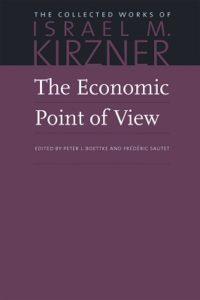The Economic Point of View: An Essay in the History of Economic Thought
By Israel Kirzner
The present essay is an attempt to explore with some thoroughness an extremely narrow area within the field of the history of economic thought. Although this area is narrow, it merits a scrutiny quite out of proportion to its extension, relating as it does to fundamental ideas around which the entire corpus of economic thought has revolved for some two centuries. It remains as true today as ever before that the direction taken by economic theory is in large measure determined by the “point of view” adopted by the economist as his special perspective. It is in this connection that the present study seeks to make its contribution, by setting up the problem in its proper context as a chapter in the history of ideas…. [From the Preface]
Translator/Editor
Laurence S. Moss, ed.
First Pub. Date
1960
Publisher
Kansas City: Sheed and Ward, Inc.
Pub. Date
1976
Comments
2nd edition. Foreword by Ludwig von Mises.
Copyright
The text of this edition is copyright ©1960, The Institute for Humane Studies. Introduction to the second edition is copyright ©1976, The Institute for Humane Studies. Reprinted by permission of the Institute for Humane Studies.
Foreword
by Ludwig von Mises
The inauguration of a systematic science of economics, an achievement of the social philosophy of the Enlightenment that also begot the doctrine of popular sovereignty, was a challenge to the powers that be. Economics shows that there prevails in the succession and interdependence of the market phenomena an inescapable regularity that man must take into full account if he wants to attain ends aimed at. Even the most mighty government, operating with the utmost severity, cannot succeed in endeavors that are contrary to what has been called “economic law.” It is obvious why despotic rulers as well as leaders of revolutionary masses disliked such doctrines. For them economics was the “dismal science” and they fought it indefatigably.
However, it was not the hostility of governments and powerful political parties that fomented the protracted discussions about the epistemological character and the logical method of economics in which the very existence and significance of this branch of knowledge were again and again questioned. What generated these debates was the vagueness that the early economists evinced in defining the field of their studies. It would be absurd to blame them for this want of clearness. They had sufficient reasons for concentrating upon those problems which they were trying to deal with and for neglecting others. What had stimulated their inquiry was definite issues of contemporary political controversies. Their great accomplishment was the discovery of the uniform order prevailing in the emergence of events previously considered chaotic. Only the later generations of economists were puzzled with the epistemological problems involved.
Doctor Kirzner’s book provides a historical account of all the solutions suggested in this debate. It is a very valuable contribution
to the history of ideas, describing the march of economics from a science of wealth to a science of human action. The author does not, in the fashion adopted by some recent histories of economic doctrines, indulge in value judgments and paradoxical observations. He prefers to follow the sober methods of the best historians of economic theories, Böhm-Bawerk and Edwin Cannan. Every economist—and for that matter everybody interested in problems of general epistemology—will read with great profit Doctor Kirzner’s analyses, especially his treatment of the famous discussion between Benedetto Croce and Vilfredo Pareto or the critical examination of the ideas of Max Weber and Lionel Robbins.
Essays on the history of economic thought are to be appreciated not only purely as history. No less important is the fact that they enable us to re-examine the present state of economic theory in the light of all attempts earlier generations made for their solution. In comparing our point of view with past achievements and errors we may either detect flaws in our own theories or find new and better reasons for their confirmation. Doctor Kirzner’s thoughtful essay is a real aid in such a re-examination and in this consists its great value.

